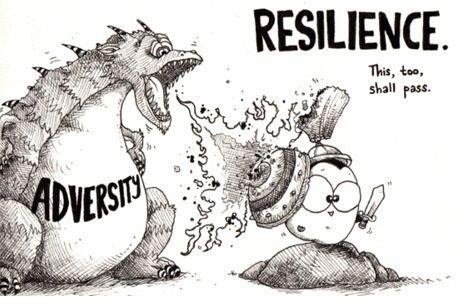What is rural community resilience?
Posted by Annie McKee on Tuesday 25 April 2017

Resilience may be defined as how a body deals with external shocks; Picture credit: www.monarchsystem.com
‘Resilience’ is a term used abundantly today, and there are a plethora of different views about what it means and how it can be assessed. A well-known online dictionary defines ‘resilience’ as the ability to recover from or adjust to negative shocks or changes. In a new project, we are considering how 'rural community resilience' can be assessed. Central to this is exploring different perspectives and understandings of resilience – those of academics, policy makers and communities themselves.
Within academia, the concept of resilience has been used in relation to shocks, economic downturns, climate change, and environmental disasters, but there is no universally accepted definition. Despite this lack of consensus, it is generally agreed that the concept of resilience in relation to ecological systems owes much to the work of the Canadian ecologist, C.S Holling. Writing in the 1970’s, he defined resilience as 'the ability of a system to absorb change and disturbance, or ‘bounce back’ to its original state'. Concerning communities, the role of proactive human agency and increased (community) wellbeing through adaptive behaviour change is highlighted. An academic perspective may therefore consider a resilient community to be one that can influence what happens to it in situations of constant and unexpected social, environmental, and political change.
Within its suite of guidance entitled ‘Preparing Scotland’, the Scottish Government defines community resilience as: “communities and individuals harnessing resources and expertise to help themselves prepare for, respond to, and recover from emergencies, in a way that complements the work of the emergency responders”. Resilience tends to be understood in relation to emergency and disaster planning (including flooding, for example), although it features within other policy areas, including those considering community empowerment. There is also a greater focus amongst policymakers on the practical interventions that may facilitate rural community resilience.
How do these academic and policy perspectives align with the definitions held by those who live in local communities? A recent discussion with a diverse group of community representatives highlighted that their understandings of resilience overlapped with other concepts such as ‘sustainability’ and ‘vibrancy’. As that discussion outlined, resilience relates to, but goes beyond, disaster responses, involving preparedness, roles and responsibilities, and community empowerment. For these representatives, the concept describes the ability of communities to deal with external pressures, as well as the possession of a belief and confidence that community action can lead to change.
From our early investigations of the academic literature, policy documents, and stakeholder engagement, it is clear that ‘resilient rural communities’ are those that are empowered, connected, cohesive, resourceful, and able to face constant change by developing new means of responding to challenges and shocks. This new project will continue to refine the definition of rural community resilience, in order to provide recommendations relevant for rural communities and policy makers, as well as for fellow researchers.
Flooding hits the community of Ballater, December 2015; Photo credit: Stephen Addy






Comments
Post new comment